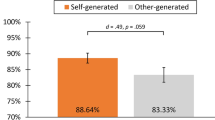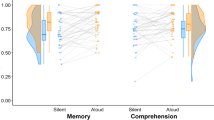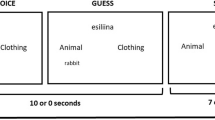Abstract
A handful of studies have claimed that error detection is improved by a proofreader’s prior encounter with the text to be scanned for errors. In these studies, however, the beneficial effect of text familiarity on proofreading has been obtained via surface encoding tasks (prior reading or proofreading). This raises the question of whether the effect is dependent on the type of encoding operations performed on the text prior to proofreading. In Experiment 1, familiarization required that subjects read an error-free passage and then either type the passage verbatim (surface encoding) or write an essay by relying on the information contained in the passage (deep encoding with generation). In Experiment 2, subjects generated sentences (deep encoding with generation), assessed whether sentences described drawings (deep encoding), or typed sentences (surface encoding). Familiarity, irrespective of the nature of the encoding operations, improved proofreading times but only surface encoding or deep encoding without generation made proofreading more accurate. In Experiment 3, text generation fostered greater subjective familiarity than either surface or deep encoding alone. It is argued that this form of enhanced familiarity may lead to expectancy effects in proofreading performance.
Similar content being viewed by others
References
S. Abramovici (1983) ArticleTitleErrors in proofreading: Evidence for syntactic control of letter processing? Memory and Cognition 11 258–261
J.S. Bowers D.L. Schacter (1990) ArticleTitleImplicit memory and test awareness Journal of Experimental Psychology: Learning, Memory, and Cognition 16 404–416
B.H. Cohen (2001) Explaining psychological statistics Wiley New York
M. Daneman M. Stainton (1993) ArticleTitleThe generation effect in reading and proofreading. Is it easier or harder to detect errors in one’s own writing? Reading and Writing: An Interdisciplinary Journal 5 297–313 Occurrence Handle10.1007/BF01027393
A. Drewnowski A.F. Healy (1977) ArticleTitleDetection of errors on the and and: Evidence for reading units larger than the word Memory and Cognition 5 636–647
J.M. Gardiner A.J. Dawson E.A. Sutton (1989) ArticleTitleSpecificity and generality of enhanced priming effects for self-generated study items American Journal of Psychology 102 295–305
P. Goolkasian (1985) ArticleTitleThe role of familiarity in proofreading The Journal of General Psychology 112 399–407
A.F. Healy (1976) ArticleTitleDetection errors on the word the: Evidence for reading units longer than letters Journal of Experimental Psychology: Human Perception and Performance 2 235–242 Occurrence Handle10.1037//0096-1523.2.2.235
A.F. Healy (1980) ArticleTitleProofreading errors on the word the: New evidence for reading units Journal of Experimental Psychology: Human Perception and Performance 6 45–47 Occurrence Handle10.1037//0096-1523.6.1.45
R.T. Kellogg (1988) ArticleTitleAttentional overload and writing performance: Effects of rough draft and outline strategies Journal of Experimental Psychology: Learning, Memory, and Cognition 14 355–365
R.T. Kellogg (2004) ArticleTitleWorking memory components in written sentence generation American Journal of Psychology 117 341–361 Occurrence Handle15457806
S. Kinoshita (2001) ArticleTitleThe role of involuntary aware memory in implicit stem and fragment completion tasks: A selective review Psychonomic Bulletin and Review 8 58–69 Occurrence Handle11340867
B.A. Levy (1983) ArticleTitleProofreading familiar text: Constraints on visual processing Memory and Cognition 11 1–12
B.A. Levy J. Begin (1984) ArticleTitleProofreading familiar text: Allocating resources to perceptual and conceptual processes Memory and Cognition 12 621–632
B.A. Levy R. Di Persio A. Hollingshead (1992) ArticleTitleFluent rereading: Repetition, automaticity, and discrepancy Journal of Experimental Psychology: Learning, Memory, and Cognition 18 957–971
A.B. Levy S. Newell J. Snyder K. Timmins (1986) ArticleTitleProcessing changes across reading encounters Journal of Experimental Psychology: Learning, Memory, and Cognition 12 467–478
C.M. MacLeod (1996) ArticleTitleHow priming affects two speeded implicit tests of remembering: Naming colors versus reading words Consciousness and Cognition 5 73–90 Occurrence Handle10.1006/ccog.1996.0005
C.M. MacLeod M.E.J. Masson (2000) ArticleTitleRepetition priming in speeded word reading: Contributions of perceptual and conceptual processing episodes Journal of Memory and Language 42 208–228 Occurrence Handle10.1006/jmla.1999.2674
C.E. McFarland T.J. Frey D.D. Rhodes (1980) ArticleTitleRetrieval of internally versus externally generated words in episodic memory Journal of Verbal Learning and Verbal Behavior 19 210–225 Occurrence Handle10.1016/S0022-5371(80)90182-6
C.D. Morris J.D. Bransford J.J. Franks (1977) ArticleTitleLevels of processing versus transfer appropriate processing Journal of Verbal Learning and Verbal Behavior 16 519–533
N.W. Mulligan (2002a) ArticleTitlePositive and negative generation effects, hypermnesia, and total recall time Memory and Cognition 30 1044–1053
N.W. Mulligan (2002b) ArticleTitlePositive and negative generation effects, hypermnesia, and total recall time Journal of Experimental Psychology: Learning, Memory, and Cognition 28 541–554
M. Pilotti M. Chodorow K.C. Thornton (2004) ArticleTitleError detection in text: Do feedback and familiarity help? Journal of General Psychology 131 242–267 Occurrence Handle15248593
A. Richardson-Klavehn J.M. Gardiner (1998) ArticleTitleDepth-of-processing effects on priming in stem completion: Tests of the voluntary-contamination, conceptual-processing, and lexical-processing hypotheses Journal of Experimental Psychology: Learning, Memory, and Cognition 24 593–609
D.L. Schacter J. Bowers J. Booker (1989) Intention, awareness, and implicit memory: The retrieval intentionality criterion S. Lewandowsky J.C. Dunn K. Kirsner (Eds) Implicit memory: Theoretical issues. Lawrence Erlbaum Associates Hillsdale, New Jersey 47–66
W.C. Shipley (1940) ArticleTitleA self-administering scale for measuring intellectual impairment and deterioration Journal of Psychology 9 371–377
E. Spargo G.R. Williston (1975) Timed readings: Level 8 Jamestown Publishers Providence, RI
J.P. Toth E.M. Reingold L.L. Jacoby (1994) ArticleTitleToward a redefinition of implicit memory: Process Dissociations following elaborative processing and self-generation Journal of Experimental Psychology: Learning, Memory, and Cognition 20 290–303
Author information
Authors and Affiliations
Corresponding author
Rights and permissions
About this article
Cite this article
Pilotti, M., Chodorow, M. & Thornton, K.C. Effects of Familiarity and Type of Encoding on Proofreading of Text. Read Writ 18, 325–341 (2005). https://doi.org/10.1007/s11145-005-4315-3
Issue Date:
DOI: https://doi.org/10.1007/s11145-005-4315-3




